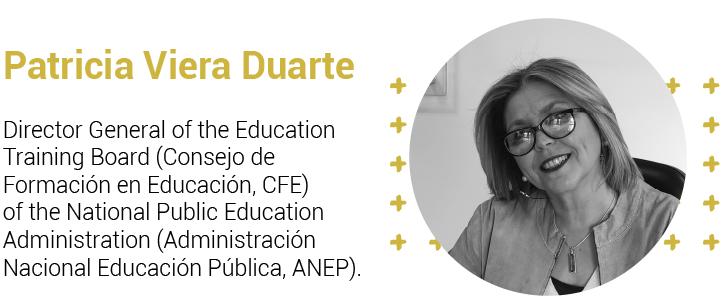
Member of the Board of Directors of the Fundación Ceibal.
With the emergence of the COVID-19 pandemic, the ANEP as a whole faced a challenge to optimize resources that already existed thanks to the Plan Ceibal, but which, with classes postponed, required new educational configurations for remote teaching in a contingency situation. This new scenario showed us a wide diversity of experiences as a result of teachers’ commitment to continue teaching. Some attempted to replicate the format of in-person classes online, others used institutional support to optimize the use of online learning environments. But in general terms, there was a clear motivation among the teaching collective to explore further the multimodality of teaching, which represented a great opportunity and challenge in theorizing on practices and in the production of teaching knowledge.
It was notable that programmes that had been in a process of development over previous years took on a new side. “Aprender Tod@s” (AT) (Learning for All), which began in 2012 with the purpose of promoting the adaptation of ICTs and strengthening them with the diverse actors in educational communities, was adapted in 2020 into an online course that prepared Masters students for extramural activities and work with families, while it was also included in the curriculum of the Early Childhood Masters (MPI, Magisterio de Primera Infancia) degree through the recognition of 5 credits as an optional curricular unit.
At the Education Training Board, the Education Technology Academic Unit (Unidad Académica de Tecnología Educativa, UATE) has given teachers work materials, tutorials and support through the Digital Technologies Orientation Teacher (Docente Orientador en Tecnologías Digitales, DOT) at every education centre and institute. The Salas Docentes (teacher coordination meetings) have been organized to provide support, not only in the use of technology, but also in the conceptualization of what it means to teach with ICTs. Experiences have been exchanged and some working groups have systematized them. Stories have been published of the first graduates under these circumstances, along with testimonies from various teachers, recounting their experiences and the significance they have had in carrying out their profession online. By way of example, this led to “Teacher Stories in Pandemic Times.” [1]
The “UAPA/UATE Training Space” was also created on the CREA platform to support online classes with tutorials on how to record videos and save them on the platform. The Academic Unit for Audiovisual Teaching (Unidad Académica de Pedagogía Audiovisual) supported school work that uses images, videos, presentations, as well as the teacher’s image and voice. It also promoted the use of free access editing programmes for making animations. The platform prepared guidelines for editing video and playing and downloading videos online; guidelines for the use of music and free access audiovisual pieces (website bank) were created, along with a course, “Cinephile teachers: audiovisual culture in teacher training” with 150 participants throughout the country, over four modules, each one including, in addition to theory training in audiovisual teaching, an audiovisual toolbox for using audiovisual materials in online classes.
Lastly, every audiovisual coordinator supported teaching practices in the following ways: sharing CINEDUCA materials (film and shorts produced) with subjects to fit the courses; with audiovisual language courses suited to the needs of the centre; filming teacher practices in in-person/online teacher training classes; filming laboratory practices. Work was also done on the optional curricular unit “Introduction to audiovisual creation” of the Masters in Early Childhood online, on audiovisual recording and audiovisual production of short films in interdisciplinary projects.
With all this, it can be considered that today CFE has a good archive of empirical evidence from the whole process of teaching in an emergency situation. The challenge in the immediate future is to further the analysis and creation of new theory categories for teaching with ICTs, hybrid modalities, multi-referential environments, and digital learning ecosystems with a methodology that makes it possible to train future teachers for the permanent creation of new teaching and learning modalities with empirical and theoretical support. Initial and permanent teacher training has taken on the challenge of constructing new educational configurations arising from research, from the production of teaching-educational knowledge for new combined formats, as well as the diffusion of results and the creation of spaces of interactions of experiences to construct alternatives and move towards collaborative innovations, in academic networks at local, national and international level.
[1] Script by Adriana Ferreira and Ariel Milstein, editing by Ariel Milstein and Fernando Harreguy with the collaboration of Laura Curbelo, MSc, and teachers Alejandra Morriel and Lorena Ardito. Available at:
